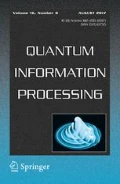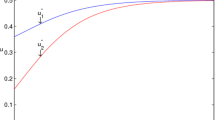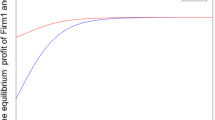Abstract
This paper investigates the complex dynamics of a nonlinear discrete-time Stackelberg duopoly game model by applying quantum game theory, where the players have heterogeneous expectations: the leader is boundedly rational and the follower thinks with adaptive expectation. The local stability of quantum equilibrium, the influence of quantum entanglement on stability region and complex dynamic behavior of the system are analyzed. The result shows that the stability of quantum Nash equilibrium can increase with the quantum entanglement increasing. The complex chaotic behaviors can appear when the quantum quantity adjustment speeds of bounded rational leader increase to a critical value, and a larger quantum entanglement will enhance the stability of the quantum Stackelberg duopoly system. Numerical simulations demonstrate the complex dynamic features via bifurcation, largest Lyapunov exponent, fractal dimensions, strange attractors and sensitivity to initial conditions.







Similar content being viewed by others
References
Landsburg, S.E.: Quantum game theory. Not. AMS 42(4), 1089–1099 (2011)
Meyer, D.A.: Quantum strategies. Phys. Rev. Lett. 82(5), 1052–1055 (1999)
Eisert, J., Wilkens, M., Lewenstein, M.: Quantum games and quantum strategies. Phys. Rev. Lett. 83(15), 3077–3080 (1999)
Marinatto, L., Weber, T.: A quantum approach to static games of complete information. Phys. Lett. A 272(5–6), 291–303 (2000)
Piotrowski, E.W., Sladkowski, J.: Quantum market games. Phys. A 312(1–2), 208–216 (2002)
Piotrowski, E.W., Sladkowski, J.: An invitation to quantum game theory. Int. J. Theor. Phys. 42(5), 1089–1099 (2003)
Keyl, M.: Fundamentals of information theory. Phys. Rep. 369(5), 431–548 (2002)
Deutsch, D.: Quantum theory of probability and decisions. Proc. R. Soc. Lond. A 455, 3129–3137 (1999)
Guo, H., Zhang, J., Koehler, G.J.: A survey of quantum games. Decis. Support Syst. 46(1), 318–332 (2008)
Busemeyer, J.R., Bruza, P.D.: Quantum Models of Cognition and Decision. Cambridge University Press, Cambridge (2012)
Li, H., Du, J.F., Massar, S.: Continuous-variable quantum games. Phys. Lett. A 306(2), 73–78 (2002)
Lo, C.F., Kiang, D.: Quantum Stackelberg duopoly. Phys. Lett. A 318(4–5), 333–336 (2003)
Lo, C.F., Kiang, D.: Quantum Stackelberg duopoly with incomplete information. Phys. Lett. A 346(1–3), 65–70 (2005)
Wang, X., Yang, X.H., Miao, L., et al.: Quantum Stackelberg duopoly of continuous distributed asymmetric information. Chin. Phys. Lett. 24(11), 3040–3043 (2007)
Wang, X., Liu, D., Zhang, J.P.: Asymmetric model of the quantum Stackelberg duopoly. Chin. Phys. Lett. 30(12), 120302–120306 (2013)
Yu, R., Xiao, R.: Quantum Stackelberg duopoly with isoelastic demand function. J. Comput. Inform. Syst. 8(9), 3643–3650 (2012)
Khan, S., Ramzan, M., Khan, M.K.: Quantum Stackelberg duopoly in the presence of correlated noise. J. Phys. A: Math. Theor. 43(43), 375301–375314 (2010)
Khan, S., Khan, M.K.: Quantum Stackelberg duopoly in noninertial frame. Chin. Phys. Lett. 28(7), 70202–70203 (2011)
Frackiewicz, P.: On subgame perfect equilibria in quantum Stackelberg duopoly with incompete information. Phys. Lett. A 382(48), 3463–3469 (2018)
Ingrid, N.H., Anna, S.N.: Game Theory: Strategies, Equilibria and Theorems. Nova Science Publishers, Inc, New York (2009)
Khan, F.S., Solmeyer, N., Balu, R., et al.: Quantum games: a review of the history, current state, and interpretation. Quantum Inf. Process. 17, 309 (2018). https://doi.org/10.1007/s11128-018-2082-8
Kolokoltsov, V.N., Malafeyev, O.A.: Understanding Game Theory. World Scientific, Singapore (2020)
Rand, D.: Exotic phenomena in games and duopoly models. J. Math. Econ. 5, 173–184 (1978)
Shi, L., Le, Y., Sheng, Z.: Analysis of price Stackelberg duopoly game with bounded Rationality. Discrete Dyn. Nat. Soc. 2014, 1–8 (2014)
Peng, Y., Lu, Q.: Complex dynamics analysis for a duopoly Stackelberg game model with bounded rationality. Appl. Math. Comput. 271, 259–268 (2015)
Peng, Y., Lu, Q., Xiao, Y.A.: dynamic Stackelberg duopoly model with different strategies. Chaos Solitons Fract. 85, 128–134 (2016)
Xiao, Y., Peng, Y., Lu, Q., et al.: Chaotic dynamics in nonlinear duopoly Stackelberg game with heterogeneous players. Phys. A 492, 1980–1987 (2018)
Yang, X.N., Peng, Y., Xiao, Y., et al.: Nonlinear dynamics of a duopoly Stackelberg game with marginal costs. Chaos Solitons Fract. 123, 185–191 (2019)
Agiza, H.N., Elsadany, A.A.: Nonlinear dynamics in the Cournot duopoly game with heterogeneous player. Phys. A 320, 512–524 (2003)
Agiza, H.N., Elsadany, A.A.: Chaotic dynamics in nonlinear duopoly game with heterogeneous players. Appl. Math. Comput. 49(3), 843–860 (2004)
Dubiel-Teleszynski, T.: Nonlinear dynamics in a heterogeneous duopoly game with adjusting players and diseconomies of scale. Commun. Nonliear Sci. Numer. Simul. 16(1), 296–308 (2011)
Puu, T.: Attractors, Bifurcation and Chaos: Nonlinear Phenomena in Economics. Springer, Berlin (2003)
Kaplan, J.L., Yorke, Y.A.: A regime observed in a fluid flow model of Lorenz. Commun. Math. Phys. 67, 93–108 (1979)
Acknowledgements
The authors gratefully acknowledge two anonymous reviewers and Editor-in-Chief Yaakov S. Weinstein for their constructive comments and valuable suggestions. This research work is supported by Humanities and Social Science Projects of Ministry of Education of China (Grant No. 21YJA630116). The Foundation of the Educational Department of Liaoning Province (Grant No. LF201783613).
Author information
Authors and Affiliations
Ethics declarations
Conflict of interest
The authors declare that they have no conflict of interest.
Additional information
Publisher's Note
Springer Nature remains neutral with regard to jurisdictional claims in published maps and institutional affiliations.
Rights and permissions
About this article
Cite this article
Zhang, X., Yang, C., Wang, Y. et al. The influence of entanglement on complex dynamics of a quantum Stackelberg duopoly with heterogeneous expectations. Quantum Inf Process 21, 56 (2022). https://doi.org/10.1007/s11128-021-03395-4
Received:
Accepted:
Published:
DOI: https://doi.org/10.1007/s11128-021-03395-4




